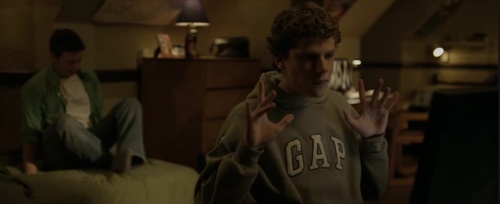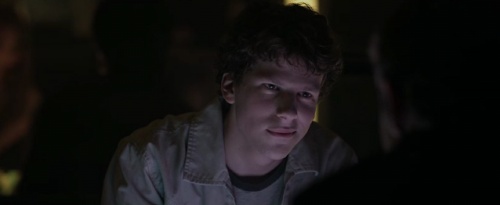The Social Network (David Fincher, 2010)

Early in David Fincher’s Facebook origin story The Social Network, nerdy and socially inept Mark Zuckerberg (Jesse Eisenberg) is chatting to the Winklevoss twins (both played by Armie Hammer). Zuckerberg has proven himself a programming whiz with a campus-blitzing piece of computer hacking; they’re a pair of old-money golden boys looking to recruit him to work on their start-up web business. Despite the modern trappings, the exchange is filtered through more traditional power dynamics, with the tall, good-looking, WASP Winklevosses deigning to let the thin, geeky, Jewish Zuckerberg into the entry hall of their exclusive campus fraternity. It’s at that moment that the analogy between David Fincher’s prestigious Oscar-favourite drama and a campus fraternity comedy such as Animal House snaps into focus.
That probably sounds ridiculous, and I don’t mean it as a putdown. But Fincher’s film does work in a strange symbiotic relationship with films of the Animal House or Revenge of the Nerds tradition. In those films, villainous rich students who look like Ted McGinley (or in the case of Revenge of the Nerds, actually are Ted McGinley) always lord it up over nerds like Zuckerberg, only for the nerds to triumph at film’s end. It’s a bit of wish fulfilment, reflecting the fact that those who write and direct films are more likely to be nerds than former campus sports stars.
As ridiculous as these films are, they have come to be part of our cultural understanding of the American college experience, and in the early scenes of The Social Network Mark Zuckerberg seems to be living out the plot of one. He is excluded from the coolest parties and campus clubs, and hangs out instead with a bunch of like-minded misfits. As in a fraternity comedy, the nerd prevails over the jocks in the end, but here it is particularly delicious, because Zuckerberg does so by effectively destroying the existing campus social regimes. His invention, Facebook, turns upside down the social structures that traditionally shaped college life – at least in the movies – by democratising and virtualising them so that they can’t be controlled by anyone on campus. It’s like Revenge of the Nerds: The Final Ever Installment.

Yet Fincher makes it all that little bit more intriguing by subverting one central conceit: we normally like the nerd. In contrast, as played by Eisenberg, Zuckerberg is supremely intelligent and yet at the same time devastatingly unsympathetic. We enjoy his wit – unfettered as it is by any sense of empathy or decorum – and marvel at his achievements without ever actually liking him. It’s almost certainly not fair to the real Zuckerberg, but it is dramatically very effective in undermining our notional sympathies. We should like this guy and root for him to either break into the cool circles or bring them down. But it’s apt that we don’t, since Zuckerberg’s real-life achievement had a distinct double-edge: it’s true that no one group on campus can control the social scene in the way they once could, but Zuckerberg himself now owns our on-line experience in a way that would have seemed unfathomable not so long ago.
All this unfolds to a characteristically crisp Aaron Sorkin script, while David Fincher’s direction is typically assured without often being show-offy. There’s only one big look-at-me visual moment – a rowing regatta treated using a nifty tilt-shift effect* – and I’m still not sure if I thought that was well-judged. Yet overall Fincher makes the film startlingly immersive for what could have been a talk-fest (and let’s face it, who didn’t snort in derision when they heard the film’s premise?) In this Fincher is well-served by cinematographer Jeff Cronenweth and particularly the wonderfully judged music by Trent Reznor and Atticus Ross.
I don’t know quite how this film made it past the army of lawyers that no doubt must have scrutinised it before release. And I’m not quite sure what we’ll make of this a few years down the track (if, that is, Zuckerberg’s likely global totalitarian virtual government still allows it to be screened). Yet it’s certainly a film of its moment, and compulsive viewing right now.
* You can see that sequence here.
Related Items
For my thoughts on Fincher’s subsequent The Girl with the Dragon Tattoo, click here.